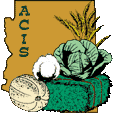
|
|
|
|

|
|||
|
|
|||
|
|
|||
Alternatives to Glyphosate for use around wheat fields Glyphosate has been one of the most widely used herbicides by home owners and farmers alike for many years. The safety of this herbicide has come under fire in recent years, most notably since a California jury awarded $289,000,000 to a school ground keeper who claimed exposure to roundup caused him to acquire cancer. Glyphosate is registered for use on wheat for the preharvest control of weeds in wheat where the grain is in at least the hard dough stage and as a harvest aid to dry down the plants. It is rarely used here for either purpose. It is occasionally used on fields and borders to keep weeds from going to seed. Growers have become interested in finding alternatives to glyphosate for killing weeds on field edges in response to current concerns. Alternative herbicides need to meet a few criteria: |
|||
| Back | |||
|
For questions or comments on any of the topics please contact Marco Pena at the Yuma Agricultural Center.
|
|||
|
Home |
Cotton | Veggies |
Forages | Grains
| Citrus |
Crop x Crop Insects | Diseases| Weeds | Pesticides | Economics | News | Weather | Research | Photos | Contacts | General Info. Copyright © 2001 University of Arizona, College of Agriculture and Life Sciences Webmaster: Al Fournier (acis@ag.arizona.edu) |
|||
